- Home
- W. Somerset Maugham
Mrs Craddock
Mrs Craddock Read online
PENGUIN CLASSICS
MRS CRADDOCK
WILLIAM SOMERSET MAUGHAM was born in 1874 and lived in Paris until he was ten years old. He was educated at The King’s School, Canterbury, and at Heidelberg University. He later walked the wards of St. Thomas’s Hospital with a view to practicing medicine, but when he had qualified, the success of his first novel, Liza of Lambeth (1897), won him over to letters. Some of his hospital experience is reflected in the story, as well as in his later masterpiece Of Human Bondage (1915). With The Moon and Sixpence (1919) and Cakes and Ale (1930), his reputation as a novelist was further enhanced.
Maugham was a celebrity by the age of thirty-three, when he became one of the most successful playwrights on the London stage. Maugham’s Edwardian comedy Lady Frederick, his first hit (1907), was followed by a string of successes just before and then after World War I. At one point Maugham had four plays running at the same time in London’s West End. His theater career ended with Sheppey (1933).
His fame as a short-story writer began in 1921 with The Trembling of a Leaf, subtitled Little Stories of the South Sea Islands, which contained “Rain.” After initial magazine publication of each story he wrote, there were ten more collections. Somerset Maugham’s general nonfiction books also reflect his love of travel; they include On a Chinese Screen (1922) and Don Fernando (1935), essays, criticism, and the self-revealing The Summing Up (1938) and A Writer’s Notebook (1949).
He traveled widely in the Far East and throughout Europe. His permanent home since before World War II was on the French Riviera, which he vacated temporarily in 1940. He became Companion of Honour in 1954; he died in 1965.
ROBERT CALDER is Professor of English at the University of Saskatchewan. He is the author of W. Somerset Maugham and the Quest for Freedom and Willie: The Life of W. Somerset Maugham, which won the 1989 Governor General’s Literary Award for Non-Fiction. Most recently he has written Beware the British Serpent: The Role of Writers in British Propaganda in the United States, 1939–1945 and A Richer Dust: Family, Memory and the Second World War.
W. SOMERSET
MAUGHAM
Mrs Craddock
Introduction and Notes by
ROBERT CALDER
PENGUIN BOOKS
Published by the Penguin Group
Penguin Group (USA) Inc., 375 Hudson Street, New York, New York 10014, U.S.A.
Penguin Group (Canada), 90 Eglinton Avenue East, Suite 700, Toronto, Ontario, Canada M4P 2Y3
(a division of Pearson Penguin Canada Inc.)
Penguin Books Ltd, 80 Strand, London WC2R 0RL, England
Penguin Ireland, 25 St Stephen’s Green, Dublin 2, Ireland (a division of Penguin Books Ltd)
Penguin Group (Australia), 250 Camberwell Road, Camberwell, Victoria 3124, Australia
(a division of Pearson Australia Group Pty Ltd)
Penguin Books India Pvt Ltd, 11 Community Centre, Panchsheel Park, New Delhi – 110 017, India
Penguin Group (NZ), 67 Apollo Drive, Rosedale, North Shore 0632, New Zealand
(a division of Pearson New Zealand Ltd)
Penguin Books (South Africa) (Pty) Ltd, 24 Sturdee Avenue, Rosebank, Johannesburg 2196, South Africa
Penguin Books Ltd, Registered Offices:
80 Strand, London WC2R 0RL, England
First published in Great Britain by William Heinemann Ltd 1902
First published in the United States of America by Doubleday, Doran & Company, Inc. 1928
Published by arrangement with Doubleday & Company, Inc.
Published in Penguin Books (UK) 1967
Published in Penguin Books (USA) 1994
This edition with an introduction and notes by Robert Calder published 2008
Copyright Doubleday & Company, Inc., 1928
Introduction and notes copyright © Robert Calder, 2008
All rights reserved
PUBLISHER’S NOTE
This is a work of fiction. Names, characters, places, and incidents are either the product of the author’s imagination or are used fictitiously, and any resemblance to actual persons, living or dead, business establishments, events, or locales is entirely coincidental.
LIBRARY OF CONGRESS CATALOGING-IN-PUBLICATION DATA
Maugham, W. Somerset (William Somerset), 1874–1965.
Mrs Craddock / W. Somerset Maugham ; introduction and notes by Robert Calder.
p. cm.
Includes bibliographical references.
ISBN: 978-1-101-66419-3
1. Marriage—Fiction. I. Calder, Robert—–. II. Title.
PR6025.A86M47 2008
823’.912—dc22 2007043879
Except in the United States of America, this book is sold subject to the condition that it shall not, by way of trade or otherwise, be lent, resold, hired out, or otherwise circulated without the publisher’s prior consent in any form of binding or cover other than that in which it is published and without a similar condition including this condition being imposed on the subsequent purchaser.
The scanning, uploading and distribution of this book via the Internet or via any other means without the permission of the publisher is illegal and punishable by law. Please purchase only authorized electronic editions, and do not participate in or encourage electronic piracy of copyrighted materials. Your support of the author’s rights is appreciated.
Contents
Introduction by ROBERT CALDER
Suggestions for Further Reading
MRS CRADDOCK
Explanatory Notes
Introduction
Somerset Maugham’s first published work, Liza of Lambeth, was a remarkable success for a beginning author. Published in September 1897, the novel was praised by a number of respected critics and, because it was mentioned in a Sunday night sermon at Westminster Abbey, its first printing was sold out. The young writer had demonstrated a deft hand at dialogue, an ability to create a vivid scene with a few carefully selected details, and a gift for drawing memorable characters. The strength of the book, however, lay in its authentic picture of the life of London’s poor that Maugham had observed when his duties as a medical student at St. Thomas’s Hospital required his venturing into the nearby slums. Protected by his doctor’s bag, he was led to the bedside of the ill and the dying “through the dark and silent streets of Lambeth, up stinking alleys and into sinister courts where the police hesitated to penetrate.”
Liza of Lambeth’s detailed re-creation of these experiences within the poor, uneducated underclass of London was timely. Under the influence of the French naturalists—notably Émile Zola, Gustave Flaubert, and Edmond and Jules Goncourt—the last two decades of the nineteenth century had seen an outpouring of British realistic slum fiction. Arthur Morrison used his experiences in London’s East End to write the powerfully evocative Tales of Mean Streets (1894) and A Child of the Jago (1896); George Gissing produced a number of grimly realistic novels, notably Workers in the Dawn (1880) and The Nether World (1889); Rudyard Kipling wrote “The Record of Badalia Herodsfoot” (1893); and a multitude of lesser-known authors—Hubert Crackanthorpe, Edwin Pugh, St. John Adcock, Richard Whiteing, and William Pett Ridge, among others—made their reputations with stories of the down-and-out of London’s ghettos. Whether by astute planning or by fortunate coincidence, Maugham was able to contribute his own skillfully written and genuine picture of the mean streets to an already popular genre of fiction.
It might have been expected that the success of Liza of Lambeth would impel the young author to write more fiction based on his experiences in the London slums or in the outpatients’ department of St. Thomas’s Hospital. He had, however, discovered some articles on the novelist’s craft by the prominent critic Andrew Lang, and he took to heart
one particular pronouncement. “It was absurd,” Maugham recalled Lang declaring, “for the young writer to write about his own day and the life about him. What could he know about them? The only novel he could hope to write that might have merit was a historical one. Here his lack of worldly wisdom, his vernal innocence, could be no hindrance.” Maugham followed this advice, and his next novel, The Making of a Saint, was a historical romance about Caterina Sforza and the siege of Forli, based on a story from Machiavelli’s History of Florence. He gathered his material in the reading room of the British Museum and wrote his novel during a summer vacation on Capri. The result was a failure: all the qualities—understatement, irony, realism, and detachment—that had transformed Maugham’s experience in the slums into compelling fiction were unsuited to historical romance. On its publication in 1898, he said, “The critics received it with coolness and the public with indifference.” Years later he wrote in his nephew Robin’s copy: “A very poor novel by W. Somerset Maugham.”
The failure of The Making of a Saint undermined the modest reputation Maugham had earned with Liza of Lambeth, and he was quick to learn his lesson. As he said much later, he came to realize that Lang’s dictum was “nonsense. In the first twenty-five years of his life the youth has gathered a multitude of impressions; if he has the novelist’s instincts he will probably have felt them more vividly than he will ever feel anything again; and the persons he has known, he will have known with an intimacy that in the turmoil and hurry of after life he will never achieve again. Who has ever known anyone later in such minute detail as a boy has known his relations, their friends and servants?”
Mrs Craddock was Maugham’s next novel, though publishers’ apprehensions about its contents delayed its publication until 1902, a year after The Hero, and it was solidly grounded on the experiences of the author’s early life. Maugham was born in Paris in 1874 to the wife of an English solicitor attached to the British embassy, and on the deaths of his mother when he was eight years old and his father two years later, he was sent to Kent to live with an aunt and an uncle, Henry MacDonald Maugham, the vicar of the seaside town of Whitstable. The couple were in their fifties and childless, and a small boy was an intrusion into a well-ordered household. Though young Willie grew to have some sort of affectionate relationship with his aunt, his uncle—from all accounts a narrow-minded, pedantic, lazy, and severe man—remained distant and unsympathetic. The effect on Maugham of this unhappy arrangement is indelibly captured in an entry in A Writer’s Notebook: “He had so little love when he was small that later it embarrassed him to be loved.”
Because of the vicar’s position in the community, the young Maugham got to observe the manners, customs, and attitudes of a rigidly stratified society, and, remembering the titled and cultured people who came to his parents’ stylish apartment on the Avenue d’Antin, he grew up with a contempt for the narrow social life of Kent. He was ashamed of the way in which his uncle deferred to the more important figures in the small community. “My uncle toadied to the local squire,” he told his nephew, “and the man was just a vulgar lout. He’d never have been tolerated in my mother’s drawing-room. My uncle was a cracking snob. I was never allowed even to speak to the local tradesmen.”
From an early age Maugham longed to escape from the emotional bleakness of the vicarage and from the narrowness of Whitstable life. Though it was some years before he was free, he found one form of escape that was to remain with him for the rest of his life—reading—and, ironically, he owed this discovery to his uncle’s considerable library. At least temporarily he could shake off the unhappiness of his physical confines and escape into the worlds of The Book of a Thousand and One Nights, Lewis Carroll’s Alice’s Adventures in Wonderland and Through the Looking Glass, Sir Walter Scott’s Waverley novels, and the adventure stories of Captain Marryat. Thus Maugham formed what he called in Of Human Bondage “the most delightful habit in the world,” one that provided him with “a refuge from all the distress of life.”
At the age of eleven, Maugham was boarded at The King’s School, six miles away in Canterbury, and he found the life there no more satisfying. Graphically described in the autobiographical Of Human Bondage, it was a miserable time for a small, shy boy with a stammer: Maugham was bullied by older, bigger boys, tormented by insensitive schoolmasters for whose intellects he had no respect, and bored by an unimaginative curriculum (more than once his name appeared in the School Black Book of boys’ misdeeds for “inattention” and “gross inattention”). He endured this existence for four years until, persuading his uncle that he should be permitted to study German in Heidelberg for several years, he left Kent behind.
Maugham had been born and spent his early childhood in Paris; twice during his King’s School days he had lived for several months in Hyères, on the French Riviera, when it appeared that he might be developing tuberculosis; and in Heidelberg he felt that he was in touch with the larger, cosmopolitan European world again. His two years in Germany were an intellectual awakening, and he came away with an understanding of many of the great avant-garde European writers—Henrik Ibsen, Henry Becque, and others—the works of revolutionary composers such as Richard Wagner; and the ideas of the most influential philosophers, Arthur Schopenhauer and Benedict Spinoza. When Maugham returned to England at the age of eighteen, it was not to Kent but to London, first as an apprentice chartered accountant and then, in the autumn of 1892, as a medical student at St. Thomas’s.
Throughout his medical training Maugham maintained his contact with Whitstable until the death of the vicar in September 1897 severed the family connection. His periodic returns to the vicarage and the life of rural Kent reminded him of the narrowness and constraint from which he had fled, and he recorded his impressions in his notebook. These observations were, he commented later, “the expressions of a very young man’s reaction to real life, or what he thought was such, and to liberty, after the sheltered and confined existence, perverted by fond fancies and the reading of novels, which was natural to a boy in the class in which I was born; and they are the expression of his revolt from the ideas and conventions of the environment in which he had been brought up.”
Maugham may have revolted against the provincial ideas and conventions of Whitstable and Canterbury, but he never left them behind. In different ways they became a fundamental element of some of his best-known fiction. In Of Human Bondage, published in 1915, they are described almost clinically as part of the forces that shape the protagonist’s character and over which he must triumph if he is to become truly independent. In Cakes and Ale, which appeared fifteen years later, the portrayal is softened by a kind of warm nostalgia, though the mores and customs of rural Kent are still the disapproving background against which the more boisterous and sensual characters must rebel. In his earliest fiction dealing with his Kentish background—a short story called “Daisy” and Mrs Craddock—the tone is sharper, more satiric, and, because the experience was still so fresh in his mind, less forgiving.
“Daisy,” which Maugham said he wrote when he was eighteen and which was published in his short story collection Orientations in 1899, tells how a young Blackstable girl elopes with a married army officer and is thus made an outcast from her family and her community. Abandoned by her lover, she is reduced to prostitution but escapes this life to become a theatrical star and to marry an aristocrat. Now affluent and having social status, she attempts to become reconciled with her family but is rejected, particularly by her rigidly unforgiving father. Daisy nonetheless settles £15 a week on them, but the story ends with her leaving Blackstable and her family forever.
Blackstable—as it is in Mrs Craddock, Of Human Bondage, and Cakes and Ale—is, of course, a thinly disguised Whitstable, and when Daisy takes a last, nostalgic walk through its streets before she departs, Maugham describes a town and its people he knew well:
Daisy walked down the High Street slowly looking at the houses she remembered, and her lips quivered a little; at every step smells blew
across to her full of memories—the smell of a tannery, the blood smell of a butcher’s shop, the sea-odour from a shop of fishermen’s clothes. . . . She looked at the booths she knew so well, the boats drawn up for the winter, whose names she knew, whose owners she had known from her childhood . . . and she looked at the grey sea; a sob burst from her; but she was very strong, and at once she recovered herself. . . . At last she came to the station, and sat in the waiting room, her heart full of infinite sadness—the terrible sadness of the past.
In Daisy’s bittersweet final departure from Blackstable, it is easy to see Maugham’s own farewell to his past, and it is presented with the contempt of a young man who, like his protagonist, sees himself as part of the world far beyond its narrow and parochial boundaries. The townspeople are shown to be full of pretension, insincerity, and love of gossip. There is a good deal of religious hypocrisy and petty vindictiveness, and the text is dotted with ironic comments about “Christian,” “Christian way,” and “Providence.” Daisy’s weak and indecisive father is especially contemptible, initially concerned about her but then assuming the narrow voice of Victorian morality, prepared to forgive her when she is suffering for her sins but loathing her when she surmounts them to achieve success and happiness.
Mrs Craddock is another farewell to Maugham’s youth and upbringing, and it too is firmly grounded in his experiences of Kent. Here, as in Of Human Bondage and Cakes and Ale, the neighboring town of “Tercanbury” is based on Canterbury, and “Faversley” stands for Faversham. For “Court Leys,” the country house that Bertha Craddock has inherited, Maugham drew on his memories of Court Lees, an estate he would have seen a few miles out of Whitstable. The Regis (that is, “King”) School that Edward Craddock attended is clearly meant to be the author’s own school, The King’s School, Canterbury. Beyond the names, there are a great many details in Mrs Craddock that indicate that Maugham captured the life of his corner of Kent as faithfully as he had described London’s slums in Liza of Lambeth.

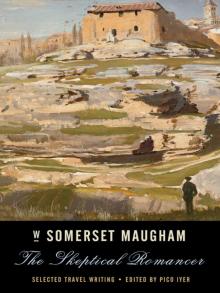 The Skeptical Romancer: Selected Travel Writing
The Skeptical Romancer: Selected Travel Writing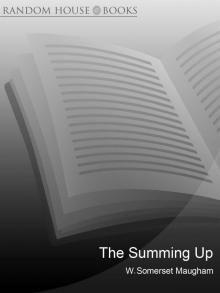 The Summing Up
The Summing Up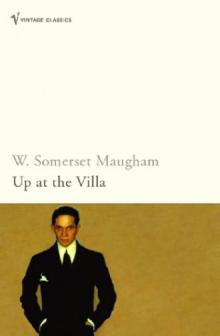 Up at the Villa
Up at the Villa The Razor's Edge
The Razor's Edge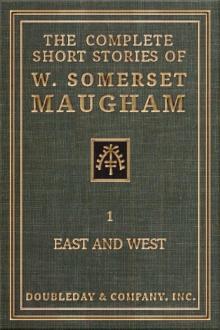 The Complete Short Stories of W. Somerset Maugham: East and West (Vol. 1 of 2))
The Complete Short Stories of W. Somerset Maugham: East and West (Vol. 1 of 2))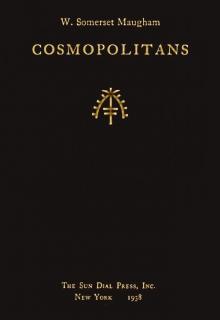 Cosmopolitans
Cosmopolitans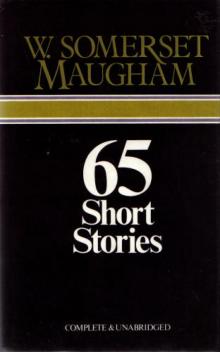 65 Short Stories
65 Short Stories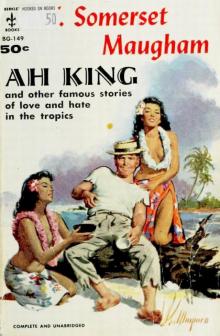 Ah King (Works of W. Somerset Maugham)
Ah King (Works of W. Somerset Maugham) Collected Short Stories: Volume 1
Collected Short Stories: Volume 1 Collected Short Stories Volume 2
Collected Short Stories Volume 2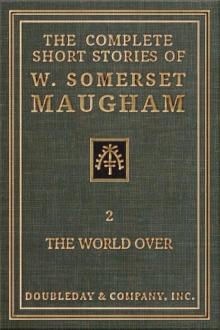 The Complete Short Stories of W. Somerset Maugham - II - The World Over
The Complete Short Stories of W. Somerset Maugham - II - The World Over Collected Short Stories Volume 4
Collected Short Stories Volume 4 Theatre
Theatre Short Stories
Short Stories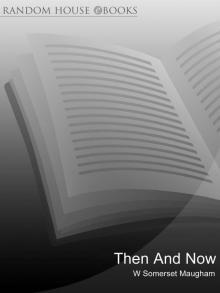 Then and Now
Then and Now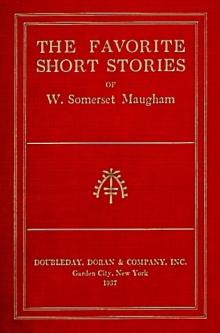 The Favorite Short Stories of W. Somerset Maugham
The Favorite Short Stories of W. Somerset Maugham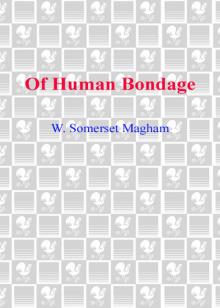 Of Human Bondage
Of Human Bondage The Magician
The Magician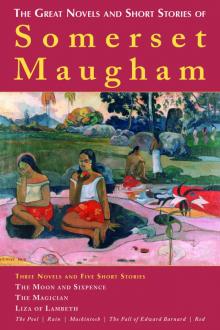 The Great Exotic Novels and Short Stories of Somerset Maugham
The Great Exotic Novels and Short Stories of Somerset Maugham A Writer's Notebook
A Writer's Notebook Christmas Holiday
Christmas Holiday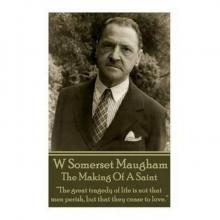 The Making of a Saint
The Making of a Saint Merry Go Round
Merry Go Round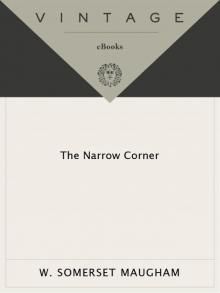 The Narrow Corner
The Narrow Corner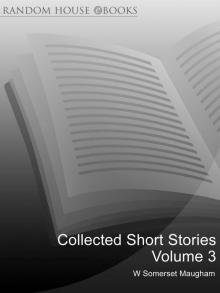 Collected Short Stories Volume 3
Collected Short Stories Volume 3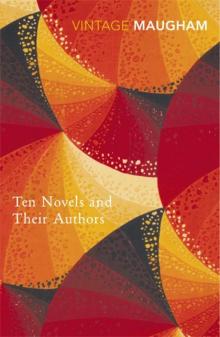 Ten Novels and Their Authors
Ten Novels and Their Authors Ashenden
Ashenden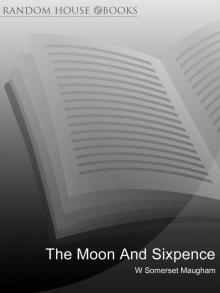 The Moon and Sixpence
The Moon and Sixpence Cakes and Ale
Cakes and Ale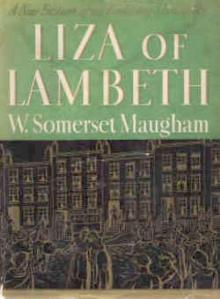 Liza of Lambeth
Liza of Lambeth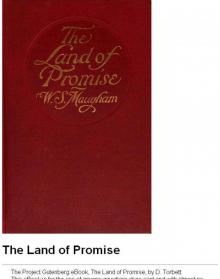 The Land of Promise: A Comedy in Four Acts (1922)
The Land of Promise: A Comedy in Four Acts (1922) A Writer's Notebook (Vintage International)
A Writer's Notebook (Vintage International)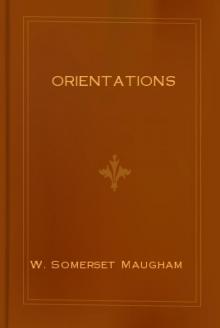 Orientations
Orientations Selected Masterpieces
Selected Masterpieces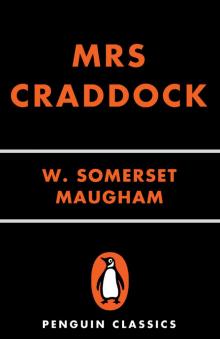 Mrs Craddock
Mrs Craddock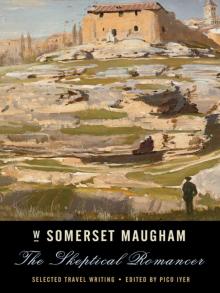 The Skeptical Romancer
The Skeptical Romancer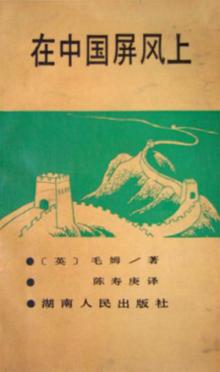 On a Chinese Screen
On a Chinese Screen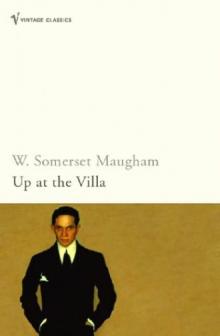 (1941) Up at the Villa
(1941) Up at the Villa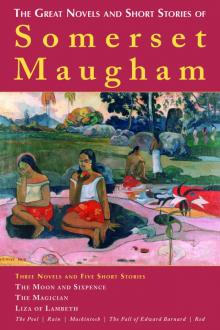 The Great Novels and Short Stories of Somerset Maugham
The Great Novels and Short Stories of Somerset Maugham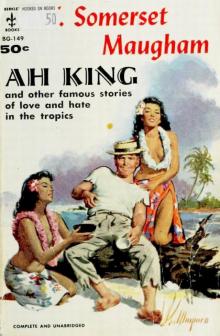 Ah King
Ah King The Explorer
The Explorer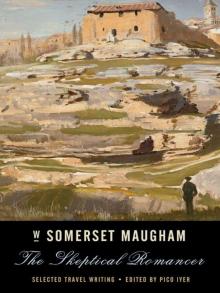 The Skeptical Romancer: Selected Travel Writing (Vintage Departures)
The Skeptical Romancer: Selected Travel Writing (Vintage Departures)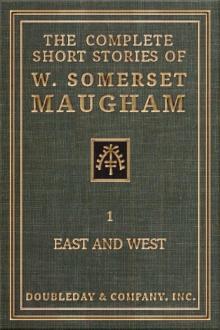 The Complete Short Stories of W. Somerset Maugham - I - East and West
The Complete Short Stories of W. Somerset Maugham - I - East and West